Appointments with Dr. Oz
By Dr. Mehmet Oz
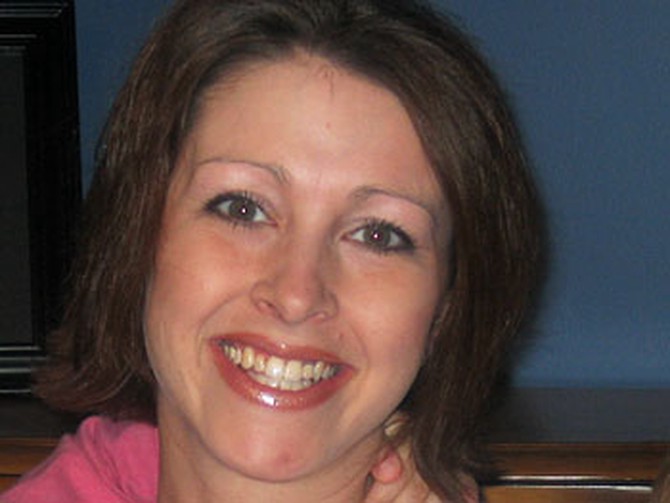
In 2004, 32-year-old Jodi hadn't been feeling well and wasn't sure what was causing her discomfort—until she saw Dr. Oz go inside the human body on the show . "He was discussing colon and bowel problems," Jodi says. "I remember freezing in fear as Dr. Oz seemed to be discussing my symptoms word for word—diarrhea, bleeding, weight loss and fatigue."
Jodi was so stunned she says she actually had to leave the room. "I knew at that point that I needed to do something," she says.
She immediately called her doctor, demanded a specialist and scheduled a colonoscopy. "Sure enough, the test found a massive tumor, and I was diagnosed with stage 3 colon cancer," she says.
Jodi was so stunned she says she actually had to leave the room. "I knew at that point that I needed to do something," she says.
She immediately called her doctor, demanded a specialist and scheduled a colonoscopy. "Sure enough, the test found a massive tumor, and I was diagnosed with stage 3 colon cancer," she says.
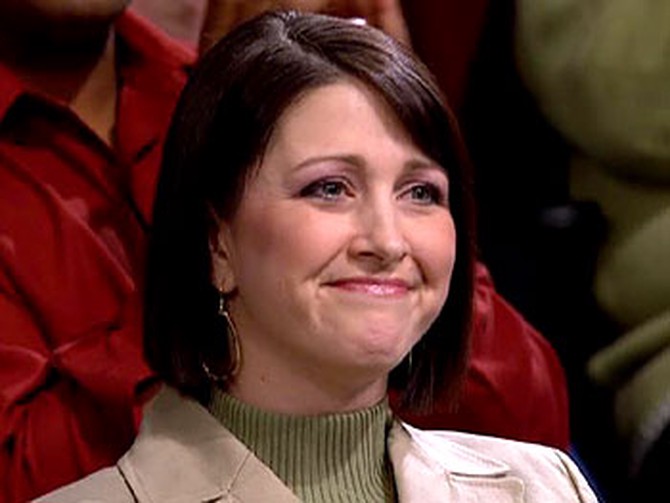
After chemotherapy, a major surgery and six months of radiation, Jodi is healthy once again. "Because of you, Dr. Oz and Oprah, I had the courage to face my fears, and I'm now cancer-free," she says. "From my kids, my husband and me, thank you from the bottom of our hearts."
Dr. Oz says he got goose bumps when he heard Jodi's story. "That's why I love doing the show, because you have an opportunity to share things with people that you really care about. What you did, which is the most important thing of all, is you became the world expert on your body. You took charge," Dr. Oz says. "That's the big message for America. That's what all these shows come back to—how you [can] take charge of your own destiny."
Dr. Oz says he got goose bumps when he heard Jodi's story. "That's why I love doing the show, because you have an opportunity to share things with people that you really care about. What you did, which is the most important thing of all, is you became the world expert on your body. You took charge," Dr. Oz says. "That's the big message for America. That's what all these shows come back to—how you [can] take charge of your own destiny."

When we first met Laura , she had just received the shock of her life. After taking Dr. Michael Roizen's aging test, the 44-year-old found out her "real age"—how old her body feels due to smoking, stress and bad diet—was actually almost 60!
After the show was over, our cameras caught up with a determined Laura. "I certainly don't want my body to be that old," she says. "This is the beginning of my journey to health, fitness, feeling good and being 44 instead of 60. This is the start."
The first stop on Laura's journey? A one-on-one wake-up call with Dr. Oz in his New York City office. "If I had to describe Laura in one word, it would be lovable. She has a great sense of humor," he says. "But I soon learned that behind the laughter is a lot of pain."
Laura says she is unhappy with her appearance and hasn't thought she was beautiful since before her 40th birthday. "One of my girlfriends at work said to me that it's like I got up one day, and my face fell," she says.
Dr. Oz says the tiny wrinkles around Laura's mouth are caused by smoking, a habit she has justified because of what happened to her mother. "She was a three pack a day-er. She quit and she gained a lot of weight, probably a hundred pounds," Laura says. "I feel that if my mother had continued to smoke, she wouldn't have gotten fat. She wouldn't have gotten sick. She wouldn't have died."
To cope with the loss of her mother, Laura says she started taking care of everyone else—except herself. "Her stress started to build, and she found a way to justify her smoking," Dr. Oz says.
After the show was over, our cameras caught up with a determined Laura. "I certainly don't want my body to be that old," she says. "This is the beginning of my journey to health, fitness, feeling good and being 44 instead of 60. This is the start."
The first stop on Laura's journey? A one-on-one wake-up call with Dr. Oz in his New York City office. "If I had to describe Laura in one word, it would be lovable. She has a great sense of humor," he says. "But I soon learned that behind the laughter is a lot of pain."
Laura says she is unhappy with her appearance and hasn't thought she was beautiful since before her 40th birthday. "One of my girlfriends at work said to me that it's like I got up one day, and my face fell," she says.
Dr. Oz says the tiny wrinkles around Laura's mouth are caused by smoking, a habit she has justified because of what happened to her mother. "She was a three pack a day-er. She quit and she gained a lot of weight, probably a hundred pounds," Laura says. "I feel that if my mother had continued to smoke, she wouldn't have gotten fat. She wouldn't have gotten sick. She wouldn't have died."
To cope with the loss of her mother, Laura says she started taking care of everyone else—except herself. "Her stress started to build, and she found a way to justify her smoking," Dr. Oz says.
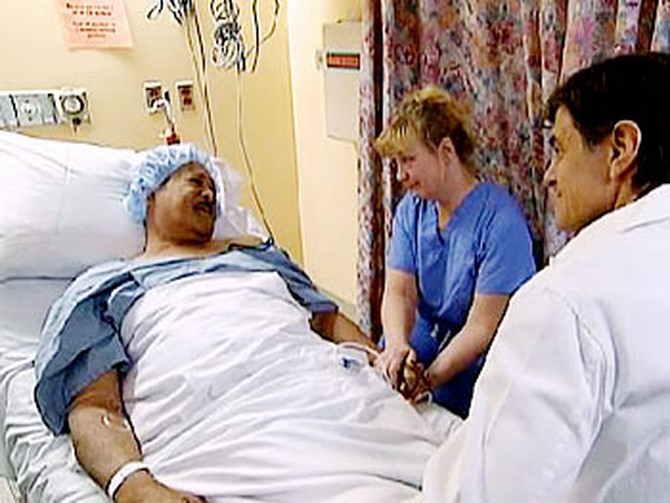
Laura's next stop on her journey to health is a hospital room. Dr. Oz introduces Laura to Hugh, another one of his patients. "I want you to understand him because he's basically you," Dr. Oz says. "In the next hour, I will open up his chest and do a triple bypass."
Like Laura, Hugh struggled with smoking, had an unhealthy diet and lived a life of stress. Hugh has some advice for Laura. "Stop the smoking, lose some weight, exercise," he says. "Get yourself together."
A tearful Laura holds his hand before surgery. "I'm more worried about him than I am me right now," she says. Dr. Oz says Hugh made it through the surgery without any problems and went home quickly.
Dr. Oz says he was struck by how empathetic Laura was to Hugh. "You've often absorbed a lot of the pain from the people you meet, and [Hugh] is a good example. You actually seemed more in pain by the prospect of the surgery than he did," Dr. Oz says. "It caught me off guard. I didn't expect that. I thought you'd be fearful because you'd take it as a threat, and you immediately adopted him. She took him into the operating room."
Still, Dr. Oz says Laura needs to be proactive about her own stress levels. "Stress may be the biggest obstacle of all," he says. "And it's remarkable how you use humor so beautifully, because you are so darned funny. But you use it like a thin coat of varnish over a big crack in the wall. It just hides the deeper issues in your life."
Like Laura, Hugh struggled with smoking, had an unhealthy diet and lived a life of stress. Hugh has some advice for Laura. "Stop the smoking, lose some weight, exercise," he says. "Get yourself together."
A tearful Laura holds his hand before surgery. "I'm more worried about him than I am me right now," she says. Dr. Oz says Hugh made it through the surgery without any problems and went home quickly.
Dr. Oz says he was struck by how empathetic Laura was to Hugh. "You've often absorbed a lot of the pain from the people you meet, and [Hugh] is a good example. You actually seemed more in pain by the prospect of the surgery than he did," Dr. Oz says. "It caught me off guard. I didn't expect that. I thought you'd be fearful because you'd take it as a threat, and you immediately adopted him. She took him into the operating room."
Still, Dr. Oz says Laura needs to be proactive about her own stress levels. "Stress may be the biggest obstacle of all," he says. "And it's remarkable how you use humor so beautifully, because you are so darned funny. But you use it like a thin coat of varnish over a big crack in the wall. It just hides the deeper issues in your life."
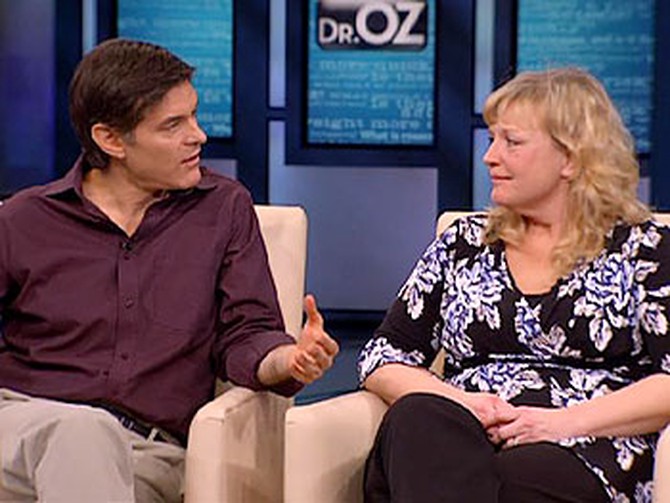
Laura also stopped at the Cleveland Clinic for a battery of tests with RealAge expert Dr. Michael Roizen. The results? "She actually is living pretty well," Dr. Roizen says. "It turns out she's really lucky. Everything she has is reversible."
A lung scan showed no signs of emphysema or cancer. Laura's stress test and heart scan also looked pretty good, but Dr. Roizen says there's still room for improvement. "It's not optimal, but she'd already started walking for the week and was getting better," he says. Blood tests indicated a few abnormalities, but Dr. Roizen says those are caused by extra weight on her body.
Laura took her test results as good news and has started reversing some of her bad habits. "I get my 10,000 steps in a day. I haven't had an ounce of junk, a bad carb or a sweet," she says. "It's all fruits, vegetables and steel-cut oatmeal."
Laura says she's also added a daily cocktail to her diet—a vitamin cocktail. It's a habit Dr. Oz says she absolutely must continue after a bone scan revealed she has osteoporosis. "Osteoporosis, which is a big problem for folks, starts when you're 20 years of age, not when you're 60 years of age," Dr. Oz says. "So if you're not getting enough vitamin D, you need to supplement that. And if you're smoking, you're going to waste away that bone."
A lung scan showed no signs of emphysema or cancer. Laura's stress test and heart scan also looked pretty good, but Dr. Roizen says there's still room for improvement. "It's not optimal, but she'd already started walking for the week and was getting better," he says. Blood tests indicated a few abnormalities, but Dr. Roizen says those are caused by extra weight on her body.
Laura took her test results as good news and has started reversing some of her bad habits. "I get my 10,000 steps in a day. I haven't had an ounce of junk, a bad carb or a sweet," she says. "It's all fruits, vegetables and steel-cut oatmeal."
Laura says she's also added a daily cocktail to her diet—a vitamin cocktail. It's a habit Dr. Oz says she absolutely must continue after a bone scan revealed she has osteoporosis. "Osteoporosis, which is a big problem for folks, starts when you're 20 years of age, not when you're 60 years of age," Dr. Oz says. "So if you're not getting enough vitamin D, you need to supplement that. And if you're smoking, you're going to waste away that bone."
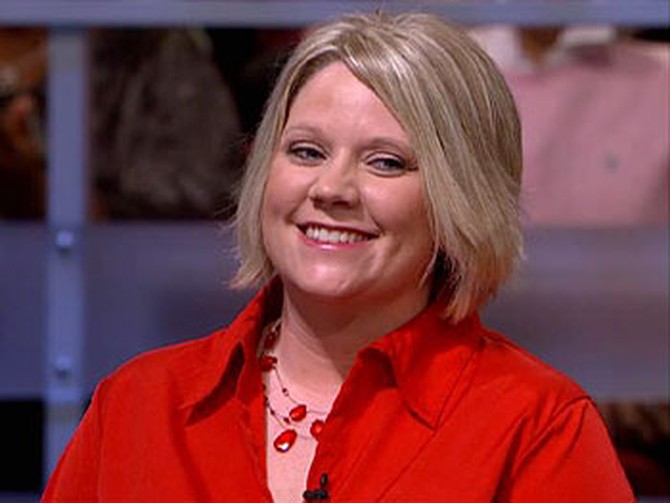
Every week we get stacks of e-mails from viewers who have medical questions they're just too embarrassed to ask anyone—except Dr. Oz.
Marcy says every time she has sex, she has multiple orgasms—anywhere from 8 to 18. "My sister can also do this. My mother. My niece. My aunt. It's mostly on my mother's side of the family. Is it hereditary, and is it harmful to have that?" she asks.
First, Dr. Oz assures Marcy that it's definitely not dangerous and tells her she's not alone—15 percent of women experience multiple orgasms. "The bigger problem is not the one that you're sharing with us, but the fact that maybe a third of women have problems [achieving] orgasms."
Dr. Oz says women's bodies are better built for multiple orgasms than men's bodies. "The blood engorges a casing around the male organ and that goes down and doesn't come back for a while," he says. "This is why there's a refractory period—a period when the male can't have another orgasm. Women, although they do have orgasms and they get engorged with blood, don't have that similar mechanism. So they can do it repetitively."
As for the genetic link, Dr. Oz says there is probably a correlation. "We think that probably 40 percent of the likelihood of a woman having orgasms is genetic," Dr. Oz says. "The most erogenous organ in the body is the brain. Your family probably has a very active portion of the brain that controls orgasms, and there is a genetic component to it."
Marcy says every time she has sex, she has multiple orgasms—anywhere from 8 to 18. "My sister can also do this. My mother. My niece. My aunt. It's mostly on my mother's side of the family. Is it hereditary, and is it harmful to have that?" she asks.
First, Dr. Oz assures Marcy that it's definitely not dangerous and tells her she's not alone—15 percent of women experience multiple orgasms. "The bigger problem is not the one that you're sharing with us, but the fact that maybe a third of women have problems [achieving] orgasms."
Dr. Oz says women's bodies are better built for multiple orgasms than men's bodies. "The blood engorges a casing around the male organ and that goes down and doesn't come back for a while," he says. "This is why there's a refractory period—a period when the male can't have another orgasm. Women, although they do have orgasms and they get engorged with blood, don't have that similar mechanism. So they can do it repetitively."
As for the genetic link, Dr. Oz says there is probably a correlation. "We think that probably 40 percent of the likelihood of a woman having orgasms is genetic," Dr. Oz says. "The most erogenous organ in the body is the brain. Your family probably has a very active portion of the brain that controls orgasms, and there is a genetic component to it."
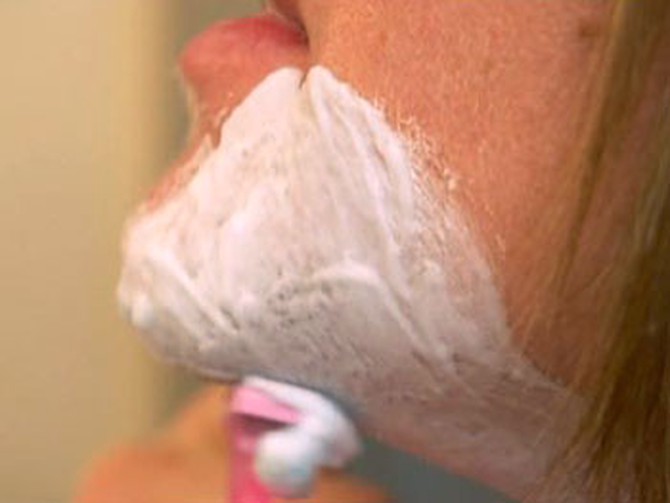
From plucking to bleaching to shaving, audience member Jaymi says she's tried almost everything to get rid of her facial hair. "It takes me like two hours to get ready every day just to deal with that," she says. Jaymi is so embarrassed about her problem, she won't even let her husband in the bathroom in the morning.
Dr. Oz says this is a very common issue for women. "Fifty percent of women in America aren't happy with the amount of body hair they have, including on their face," he says. "The things you're doing, by the way, are perfectly fine. But we also want to find out why it's happening."
Jaymi's periods are regular, so Dr. Oz says she probably isn't suffering from polycystic ovarian disease, which affects 5–10 percent of American women. Polycystic ovarian disease, which is very treatable, is caused by hormones, and extra testosterone can cause facial hair.
Dr. Oz says it still couldn't hurt for Jaymi to get her hormones checked. Birth control pills might make a difference, he says. "Certainly these pills can be effective in regulating testosterone, and some of these pills are pretty effective at reducing the hair from coming back," he says.
In the meantime, Dr. Oz says Jaymi can investigate a few more cosmetic options, like waxing or laser removal. He also wants to set the record straight on shaving—it won't cause more hair to grow back. "The hair follicle is a hair follicle," he says. "What happens is it comes back a little bit harder." Dr. Oz also recommends shaving instead of plucking to avoid pimples.
Dr. Oz says that by sharing her story, Jaymi may have helped a lot of people. "Thank you for asking the question that a lot of people are wondering about," Dr. Oz says. "Thanks for being brave. That's what it's all about."
Dr. Oz says this is a very common issue for women. "Fifty percent of women in America aren't happy with the amount of body hair they have, including on their face," he says. "The things you're doing, by the way, are perfectly fine. But we also want to find out why it's happening."
Jaymi's periods are regular, so Dr. Oz says she probably isn't suffering from polycystic ovarian disease, which affects 5–10 percent of American women. Polycystic ovarian disease, which is very treatable, is caused by hormones, and extra testosterone can cause facial hair.
Dr. Oz says it still couldn't hurt for Jaymi to get her hormones checked. Birth control pills might make a difference, he says. "Certainly these pills can be effective in regulating testosterone, and some of these pills are pretty effective at reducing the hair from coming back," he says.
In the meantime, Dr. Oz says Jaymi can investigate a few more cosmetic options, like waxing or laser removal. He also wants to set the record straight on shaving—it won't cause more hair to grow back. "The hair follicle is a hair follicle," he says. "What happens is it comes back a little bit harder." Dr. Oz also recommends shaving instead of plucking to avoid pimples.
Dr. Oz says that by sharing her story, Jaymi may have helped a lot of people. "Thank you for asking the question that a lot of people are wondering about," Dr. Oz says. "Thanks for being brave. That's what it's all about."
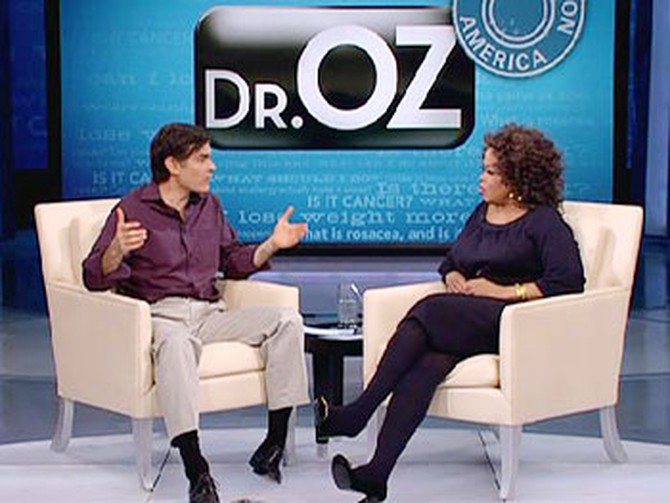
Settle down class, Dr. Oz is beginning a series of homework assignments
for you—called Prescription America—that he says are critical to your health and
the health of your loved ones.
Whether you call them "sodas," "pops," "tonics" or "soft drinks," Dr. Oz's first assignment for you is to cut these sugary drinks out of your life for two weeks.
"The entire obesity epidemic, according to all the long-term studies we've done, comes down to [consuming] 100 calories less in a day. That's it," he says. "Now a soft drink usually has about 160 calories. Plus, on average, you'll eat an extra 125 calories at the meal you're having with the soft drink. If you can just cut out that soft drink, then you're going to be able to lose an estimated 15 pounds over the course of a year."
Fortunately, Dr. Oz is allowing some substitution options. If you love the fizziness of soda, you can drink other nonsugary carbonated beverages. If you're addicted to the caffeine, try switching to coffee or green tea, which he says are much healthier options.
"We've got to break those habits that you've formed," Dr. Oz says, "to remind you what life should be like."
Whether you call them "sodas," "pops," "tonics" or "soft drinks," Dr. Oz's first assignment for you is to cut these sugary drinks out of your life for two weeks.
"The entire obesity epidemic, according to all the long-term studies we've done, comes down to [consuming] 100 calories less in a day. That's it," he says. "Now a soft drink usually has about 160 calories. Plus, on average, you'll eat an extra 125 calories at the meal you're having with the soft drink. If you can just cut out that soft drink, then you're going to be able to lose an estimated 15 pounds over the course of a year."
Fortunately, Dr. Oz is allowing some substitution options. If you love the fizziness of soda, you can drink other nonsugary carbonated beverages. If you're addicted to the caffeine, try switching to coffee or green tea, which he says are much healthier options.
"We've got to break those habits that you've formed," Dr. Oz says, "to remind you what life should be like."
Published 03/14/2008

